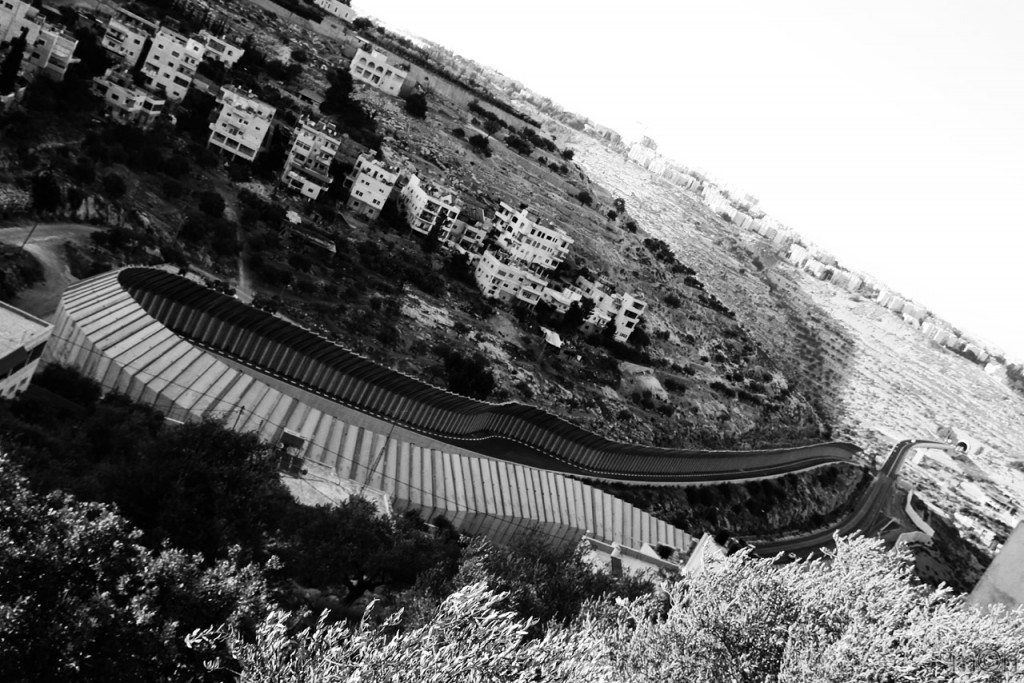A clean, deranged war

August 6, 2013
Hebron is a ghost city. Divided, transformed, vacant. I recognise its slippery paving stones and low-rent shops at the heart of the old town, selling souvenirs at give-away prices. The shopkeepers smile and say hello.
Amal gets out of the service with Karel and I. She guides us through the maze of narrow streets and markets with her friend Diyaa. She is twenty-three, he is only eighteen, and they take us everywhere. We barely know each other but already we’re laughing together. A vast green park… let’s go! But Diyaa tells us to stop. We must not go any farther. He must not, at any rate: Palestinians are forbidden from entering the park. What the county needs is a booster shot of anti-dehumanising vaccine. In his hands, Diyaa holds his digital reflex camera and discretely snaps photos of the settlers who cross our path; Jews and Arabs share the street until the next intersection.
Time flies and the sun beats down. Having bought a hookah vase, a few knick-knacks and sweet milk with almonds, we take a rest in the cool air of the shopping centre, where each store is kitschier than the next. The sartorial designs displayed in cheap stores leaves much to be desired, and I can’t help making gentle fun of the shapeless t-shirts, cushions with heart motifs and faded coats.
In the evening, a concert is taking place in Bethlehem, but Osama invites us to his home beforehand. We must hurry – soon there won’t be any more services on the roads to take us there. We press on across the mountain all the way to the main road. All the cars are full, so we decide to hitchhike. A Palestinian couple in their forties feel sorry for the sunburnt European duo; they pick us up on the roadside. They don’t speak English, they just repeat the same words and eventually our communication comes down to smiles. Osama welcomes us in his simple house, its walls devoid of decoration: tonight is his nephew Talek’s birthday. He is turning ten. His family invites us to sit on mattresses around a low table. Rice, hummus, meat, Coke, cheese… We’re served seconds and our glasses are refilled without us asking. Then, friends of the family walk in with dessert. There are two enormous cakes, plates of cookies and sweets and everyone sings “Happy Birthday” in English and Arabic. Talek blows out his candles with the help of his younger brother, who is all too eager to turn the ten little flames into smoke. The plates are laden with food – we have to eat. They have nothing but they offer us everything. Then, it’s time to head off to the concert, after expressing thanks again for the well-meaning smiles and warmth.

Osama is thrilled; he loves Trio Jouban, the first Palestinian band to tour Europe. “They played at the Olympia!” In the vast wooden auditorium, the concert begins at last, a whole hour late – Oh punctuality, how you like to mock mankind in this country. Osama sings and dances in his seat. The music is irresistible and intense, and the lights set the musicians’ ouds on fire!
We head to bed, feeling exhausted. Tomorrow, we’re off to Ramallah to meet Emile, a cheeky actor friend who will soon be performing “The Gaza Monologues” on stage, a series of narratives written by children after the violence of January 2009. “One day,” recites a child, “I was on the road, fleeing, because bombs were falling from the sky. I wasn’t running, not too fast, because my legs are short and an ambulance was rushing in the opposite direction. Then, just as I reached it, the vehicle disintegrated and I was hurled into the air by the impact. But I was unhurt, so I stood up and I walked some more. Then I fell; I died. Today, at last, I can sleep in my big bed, which feels so much bigger than before. I miss my brother; today I am alone.” Emile narrates humbly and I close my eyes.
Ramallah bids us goodbye and it’s time to go back, once more. The sun beats down on the town and its countless markets selling everything and anything. We wave goodbye and Emile vanishes. The traffic leaving the town is dense on the winding road flanked by desert valleys and Bedouin camps. We fall asleep, rocked by the bumps and potholes, watching settlements eat up more and more of the surrounding mountains. Soon we reach Bethlehem, and the red sign “Area A – Dangerous for your lives” punctures our view. How can such absurdity dominate the world?

Translated by Andrea Davoust, edited by Aidan McMahon.







